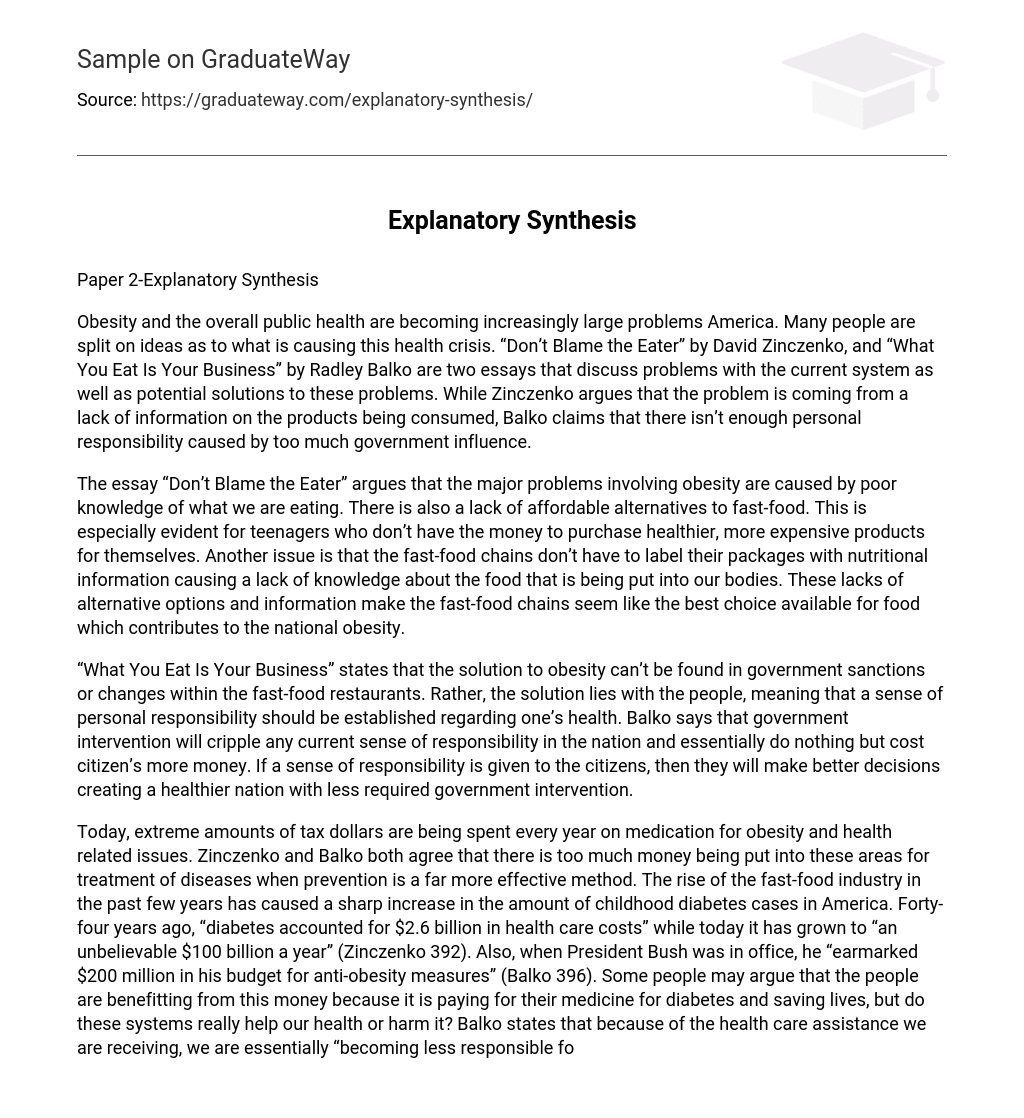Paper 2 is an Explanatory Synthesis.
Obesity and public health are major concerns in America. The causes of this health crisis are debated, with David Zinczenko’s “Don’t Blame the Eater” and Radley Balko’s “What You Eat Is Your Business” offering different perspectives. Zinczenko suggests that a lack of information on consumed products is to blame, while Balko argues that excessive government influence leads to insufficient personal responsibility.
The essay “Don’t Blame the Eater” contends that insufficient understanding of our food choices causes the primary problems associated with obesity. Additionally, there is a limited availability of affordable options apart from fast-food, particularly affecting teenagers who lack the financial means to purchase healthier but pricier alternatives. Moreover, a deficiency in nutritional information labeling on fast-food packages further exacerbates the lack of awareness about the food we consume. Together, these shortages of options and information create an illusion that fast-food chains are the most favorable choice for sustenance, ultimately contributing to the nation’s obesity epidemic.
“What You Eat Is Your Business” argues that addressing obesity cannot be achieved through government regulations or changes within fast-food restaurants. Instead, the solution lies in individual responsibility for one’s own health. According to Balko, government intervention would undermine personal accountability and only burden citizens with additional expenses. By empowering individuals with a sense of responsibility, healthier choices can be made, reducing the need for extensive government intervention
According to Zinczenko and Balko, the excessive spending of tax dollars on medications for obesity and health issues is a major concern. Both authors believe that prevention is a more effective approach than treating diseases. The fast-food industry’s growth has led to a significant increase in childhood diabetes cases in America. Diabetes healthcare costs have skyrocketed from $2.6 billion to an astonishing $100 billion annually (Zinczenko 392). Additionally, during President Bush’s tenure, $200 million was allocated for anti-obesity measures (Balko 396). While some argue that this funding benefits individuals by covering diabetes medicine and saving lives, Balko suggests that it actually reduces personal responsibility for one’s health while increasing responsibility for others’ well-being (Balko 396).
According to Balko, the government’s payment for obesity related medications reduces the incentive for people to improve their eating habits, thus eliminating personal responsibility and harming their health. While Zinczenko acknowledges the use of government medical systems, he believes individuals should take responsibility for their health. He argues that the lack of food options, rather than free medication, contributes to this lack of responsibility. Zinczenko highlights the difficulty in finding healthier alternatives in the abundance of fast-food restaurants or the high costs associated with them. This issue is particularly pronounced among teenagers who have limited financial resources, leading to increased obesity rates among younger generations.
The government’s role in regulating product sales and packaging information is a divisive topic among many. According to Zinczenko, fast-food companies are not adequately providing warnings on their labels regarding the potential risks of consuming their products frequently. He further argues that even if there are warnings or nutritional information present, they can sometimes be difficult to comprehend. Zinczenko proposes that incorporating more informative labels on packaging could improve consumer awareness and promote healthier choices. Ideally, this would lead to a more knowledgeable American population regarding the hazards of overindulging in fast food, resulting in a healthier nation. Conversely, Balko advocates for minimal government influence on food products.
According to Balko, personal responsibility plays a crucial role in suppressing government influence. When individuals are responsible for the well-being of others, society tends to accept government restrictions more readily (Balko 397). This implies that the government has the power to regulate what items are included on menus or sold in stores and can assign blame to food companies for the unhealthy habits of consumers (Balko 397). If people assume greater responsibility, then the food industry will experience less government intervention. Despite differing opinions on solutions, Zinczenko and Balko both recognize significant issues with our nation’s health. Whether individuals need better education about their food or should uphold a stronger sense of personal accountability, we must persist in searching for a resolution to the national health crisis.
Works Cited
Balko, Radley. “What You Eat Is Your Business.” Cato.org, 2004. Essay.
Zinczenko, David. “Don’t Blame the Eater.” New York City: New York Times, 2002. Essay.





